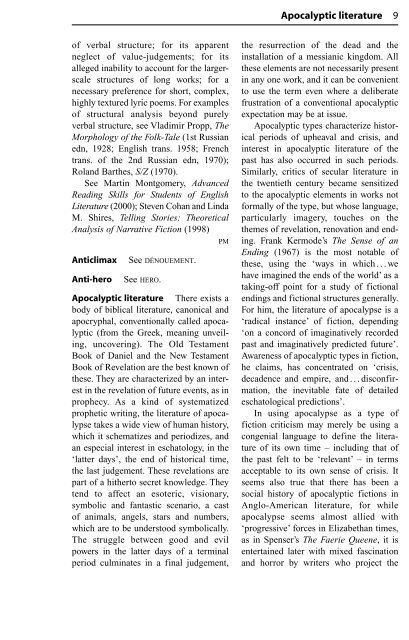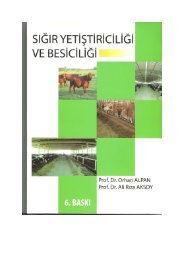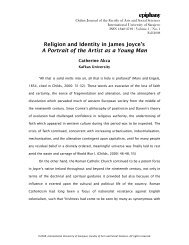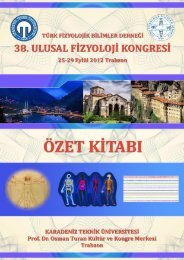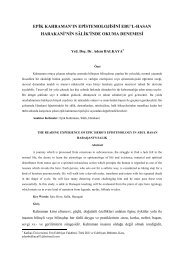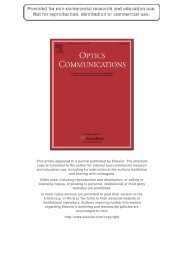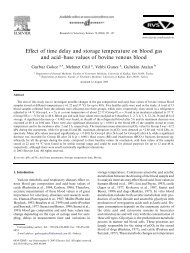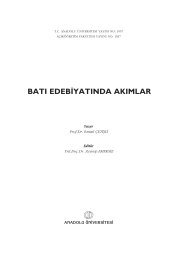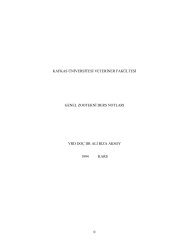The Routledge Dictionary of Literary Terms
The Routledge Dictionary of Literary Terms
The Routledge Dictionary of Literary Terms
You also want an ePaper? Increase the reach of your titles
YUMPU automatically turns print PDFs into web optimized ePapers that Google loves.
<strong>of</strong> verbal structure; for its apparent<br />
neglect <strong>of</strong> value-judgements; for its<br />
alleged inability to account for the largerscale<br />
structures <strong>of</strong> long works; for a<br />
necessary preference for short, complex,<br />
highly textured lyric poems. For examples<br />
<strong>of</strong> structural analysis beyond purely<br />
verbal structure, see Vladimir Propp, <strong>The</strong><br />
Morphology <strong>of</strong> the Folk-Tale (1st Russian<br />
edn, 1928; English trans. 1958; French<br />
trans. <strong>of</strong> the 2nd Russian edn, 1970);<br />
Roland Barthes, S/Z (1970).<br />
See Martin Montgomery, Advanced<br />
Reading Skills for Students <strong>of</strong> English<br />
Literature (2000); Steven Cohan and Linda<br />
M. Shires, Telling Stories: <strong>The</strong>oretical<br />
Analysis <strong>of</strong> Narrative Fiction (1998)<br />
Anticlimax See DÉNOUEMENT.<br />
Anti-hero See HERO.<br />
PM<br />
Apocalyptic literature <strong>The</strong>re exists a<br />
body <strong>of</strong> biblical literature, canonical and<br />
apocryphal, conventionally called apocalyptic<br />
(from the Greek, meaning unveiling,<br />
uncovering). <strong>The</strong> Old Testament<br />
Book <strong>of</strong> Daniel and the New Testament<br />
Book <strong>of</strong> Revelation are the best known <strong>of</strong><br />
these. <strong>The</strong>y are characterized by an interest<br />
in the revelation <strong>of</strong> future events, as in<br />
prophecy. As a kind <strong>of</strong> systematized<br />
prophetic writing, the literature <strong>of</strong> apocalypse<br />
takes a wide view <strong>of</strong> human history,<br />
which it schematizes and periodizes, and<br />
an especial interest in eschatology, in the<br />
‘latter days’, the end <strong>of</strong> historical time,<br />
the last judgement. <strong>The</strong>se revelations are<br />
part <strong>of</strong> a hitherto secret knowledge. <strong>The</strong>y<br />
tend to affect an esoteric, visionary,<br />
symbolic and fantastic scenario, a cast<br />
<strong>of</strong> animals, angels, stars and numbers,<br />
which are to be understood symbolically.<br />
<strong>The</strong> struggle between good and evil<br />
powers in the latter days <strong>of</strong> a terminal<br />
period culminates in a final judgement,<br />
Apocalyptic literature 9<br />
the resurrection <strong>of</strong> the dead and the<br />
installation <strong>of</strong> a messianic kingdom. All<br />
these elements are not necessarily present<br />
in any one work, and it can be convenient<br />
to use the term even where a deliberate<br />
frustration <strong>of</strong> a conventional apocalyptic<br />
expectation may be at issue.<br />
Apocalyptic types characterize historical<br />
periods <strong>of</strong> upheaval and crisis, and<br />
interest in apocalyptic literature <strong>of</strong> the<br />
past has also occurred in such periods.<br />
Similarly, critics <strong>of</strong> secular literature in<br />
the twentieth century became sensitized<br />
to the apocalyptic elements in works not<br />
formally <strong>of</strong> the type, but whose language,<br />
particularly imagery, touches on the<br />
themes <strong>of</strong> revelation, renovation and ending.<br />
Frank Kermode’s <strong>The</strong> Sense <strong>of</strong> an<br />
Ending (1967) is the most notable <strong>of</strong><br />
these, using the ‘ways in which...we<br />
have imagined the ends <strong>of</strong> the world’ as a<br />
taking-<strong>of</strong>f point for a study <strong>of</strong> fictional<br />
endings and fictional structures generally.<br />
For him, the literature <strong>of</strong> apocalypse is a<br />
‘radical instance’ <strong>of</strong> fiction, depending<br />
‘on a concord <strong>of</strong> imaginatively recorded<br />
past and imaginatively predicted future’.<br />
Awareness <strong>of</strong> apocalyptic types in fiction,<br />
he claims, has concentrated on ‘crisis,<br />
decadence and empire, and...disconfirmation,<br />
the inevitable fate <strong>of</strong> detailed<br />
eschatological predictions’.<br />
In using apocalypse as a type <strong>of</strong><br />
fiction criticism may merely be using a<br />
congenial language to define the literature<br />
<strong>of</strong> its own time – including that <strong>of</strong><br />
the past felt to be ‘relevant’ – in terms<br />
acceptable to its own sense <strong>of</strong> crisis. It<br />
seems also true that there has been a<br />
social history <strong>of</strong> apocalyptic fictions in<br />
Anglo-American literature, for while<br />
apocalypse seems almost allied with<br />
‘progressive’ forces in Elizabethan times,<br />
as in Spenser’s <strong>The</strong> Faerie Queene, it is<br />
entertained later with mixed fascination<br />
and horror by writers who project the


